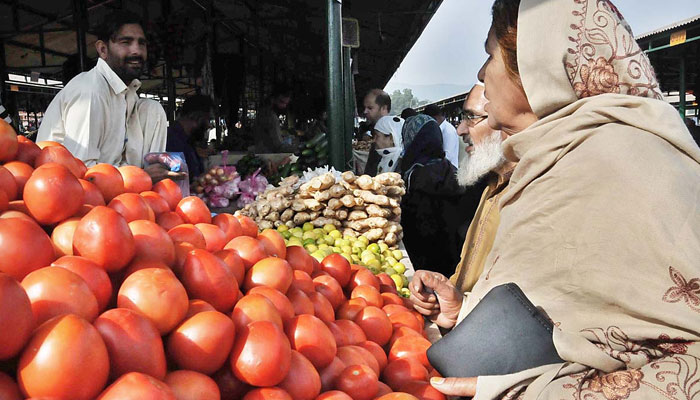November inflation to spike on gas price adjustment, dashing slowdown hopes
KARACHI: Inflation is expected to surge in November, primarily due to a massive hike in gas prices, according to brokerage reports released on Wednesday.
The consumer price index (CPI), which measures changes in the prices of goods and services, is likely to rise to 28.6-29.6 percent year-on-year in November, up from 26.9 percent in October.
A report by brokerage Insight Securities predicts that the inflation rate will register a 2.1 percent month-on-month jump, defying earlier expectations of a gradual slowdown from September onwards. Optimus Capital Management estimates that the CPI will increase by 2.9 percent month-on-month, primarily driven by an 11.6 percent jump in the housing index due to gas price revision and a 1.6 percent increase in the food index.
The primary cause behind the expected spike in November inflation is the adjustment of recently imposed fixed charges within the gas tariff structure. The weekly sensitive price index (SPI) inflation released on November 16 showed an astonishing 480 percent surge in gas prices.
However, a slight respite is expected from a 4.0 percent decrease in the transport index due to lower average fuel prices in November. The impact of the gas price hike was partially mitigated by the decline in fuel prices and the month-on-month fall in the food commodity adjustment (FCA).
Food inflation is attributed to a sharp increase in the prices of perishable items such as onions, tomatoes, potatoes, and eggs, as well as tea. Despite an increase in supply from imports, wheat prices still rose month-on-month, while sugar and cooking oil showed a significant decline during this period, based on weekly SPI data from the Pakistan Bureau of Statistics.
The recently implemented axle load regime, which limits the weight of goods transported by trucks, could put some pressure on the price levels of goods.
The higher October fuel cost adjustment (FCA) demanded at 3.5 rupees per kilowatt hour (to be applicable in December) on electricity charges and a second-round impact of gas price increase could keep inflation under pressure. However, the base effect during the second half of the fiscal year is likely to help absorb the impact.
Commodity and energy prices, along with the exchange rate of the rupee against the U.S. dollar, will remain important factors in keeping the CPI under control.
The reports projected the average inflation for the first five months of the fiscal year 2023/24 (July-June) to be 28.5 percent, compared with 25.2 percent in the same period last year and with an estimated ending at 19.4 percent year-on-year in June 2024.
They predicted that the State Bank of Pakistan (SBP) is likely to maintain the interest rate in its upcoming monetary policy committee (MPC) meeting due to the higher-than-estimated inflation in November. However, the SBP could opt to initiate an easing cycle in the first quarter of 2024, given the high base effect in the second half of the fiscal year.
-
 Sarah Chalke Recalls Backlash To 'Roseanne' Casting
Sarah Chalke Recalls Backlash To 'Roseanne' Casting -
 Pamela Anderson, David Hasselhoff's Return To Reimagined Version Of 'Baywatch' Confirmed By Star
Pamela Anderson, David Hasselhoff's Return To Reimagined Version Of 'Baywatch' Confirmed By Star -
 Willie Colón, Salsa Legend, Dies At 75
Willie Colón, Salsa Legend, Dies At 75 -
 Prince Edward Praised After Andrew's Arrest: 'Scandal-free Brother'
Prince Edward Praised After Andrew's Arrest: 'Scandal-free Brother' -
 Shawn Levy Recalls Learning Key Comedy Tactic In 'The Pink Panther'
Shawn Levy Recalls Learning Key Comedy Tactic In 'The Pink Panther' -
 King Charles Fears More Trouble As Monarchy Faces Growing Pressure
King Charles Fears More Trouble As Monarchy Faces Growing Pressure -
 Inside Channing Tatum's Red Carpet Return After Shoulder Surgery
Inside Channing Tatum's Red Carpet Return After Shoulder Surgery -
 Ryan Coogler Brands 'When Harry Met Sally' His Most Favourite Rom Com While Discussing Love For Verstality
Ryan Coogler Brands 'When Harry Met Sally' His Most Favourite Rom Com While Discussing Love For Verstality -
 Sarah Pidgeon Explains Key To Portraying Carolyn Bessette Kennedy
Sarah Pidgeon Explains Key To Portraying Carolyn Bessette Kennedy -
 Justin Bieber Rocked The World With Bold Move 15 Years Ago
Justin Bieber Rocked The World With Bold Move 15 Years Ago -
 Sam Levinson Wins Hearts With Huge Donation To Eric Dane GoFundMe
Sam Levinson Wins Hearts With Huge Donation To Eric Dane GoFundMe -
 Kate Middleton Steps Out First Time Since Andrew Mountbatten-Windsor's Arrest
Kate Middleton Steps Out First Time Since Andrew Mountbatten-Windsor's Arrest -
 Inside Nicole 'Snooki' Polizzi's 'private' Marriage With Husband Jionni LaValle Amid Health Scare
Inside Nicole 'Snooki' Polizzi's 'private' Marriage With Husband Jionni LaValle Amid Health Scare -
 Germany’s Ruling Coalition Backs Social Media Ban For Children Under 14
Germany’s Ruling Coalition Backs Social Media Ban For Children Under 14 -
 Meghan Markle Shuts Down Harry’s Hopes Of Reconnecting With ‘disgraced’ Uncle
Meghan Markle Shuts Down Harry’s Hopes Of Reconnecting With ‘disgraced’ Uncle -
 Liza Minnelli Alleges She Was Ordered To Use Wheelchair At 2022 Academy Awards
Liza Minnelli Alleges She Was Ordered To Use Wheelchair At 2022 Academy Awards




